"Happiness is a choice."
Many of us may have come across or heard this saying before. But what does it truly mean when happiness is said to be a choice? How do we choose to be happy despite the obstacles that life puts in our way, the sour experiences, and perhaps even toxic people or relationships?
The truth is, your mood, how you internalize your circumstances, and how you choose to react to the people and things around, you are malleable and in your control. Being able to gain a sense of control over our emotions will require learning, un-learning, and re-learning for most of us. Re-wiring our brains and some very persistent mental and emotional habits will take time and effort.
How to Choose Happiness and Create a Better Life Using Journaling
Photo by Eye for Ebony / Unsplash
1. Start your day with daily affirmations.
Daily affirmations are positive statements that reassure you and give you the confidence that you can indeed achieve what you put your mind to. Affirmations are recited in the fist person point of view and in the present tense.
Here are some example of affirmations :
- "I am capable of getting through the day without setbacks."
- "I am capable of getting everything on my task-list done today."
- "I am capable of acting with patience."
- "Today will be a productive day for me."
- "I am grateful for everything I have in my life."
- "I am independent and self-sufficient."
- "I can be whatever I want to be and anything I put my heart and mind to."
- "I will use obstacles to motivate me to learn and grow."
Affirmations can be used to build your confidence and self-esteem, to improve your outlook on life, and to reassure you that everything you want is truly in your reach. More often than not, it is doubt and skepticism that holds you back and prevents you from grabbing what you want. Choose affirmations that are based in your truth and address your current wants and needs. These affirmations should spur and motivate you to go after something you want or need in life that feeds your happiness and satisfaction.
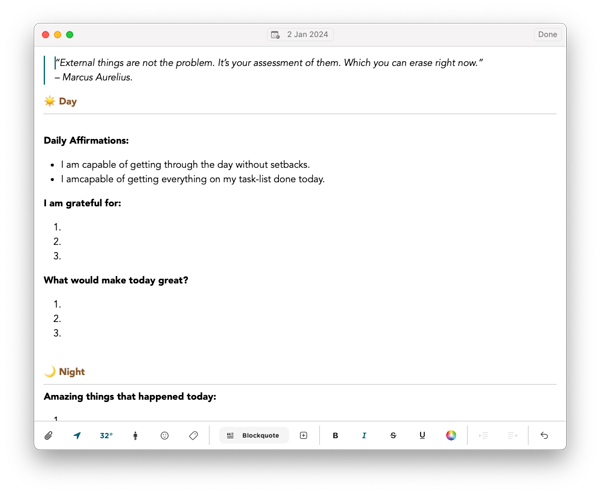
A journal such as Journey can be an invaluable companion in adopting the practice of beginning each day with daily affirmations. In the quiet moments of the morning, it serves as a blank canvas to inscribe words of empowerment and intention. Writing down affirmations in a journal helps to cement them into your consciousness, transitioning these positive statements from mere thoughts to a written commitment. This act of transcribing affirmations amplifies their impact, as the physical process of writing engages the brain in a more profound way than simply thinking or speaking the words.
Photo by Marcos Paulo Prado / Unsplash
It creates a ritualistic space for setting a tone of self-belief and purpose each day. Moreover, the journal becomes a repository of personal encouragement; on days when self-doubt creeps in, flipping through past affirmations can provide a powerful boost of motivation and a reminder of one's inherent worth and potential. By regularly reflecting on these personal declarations, a journal transforms into a tool that fosters a positive mindset and a resilient spirit, ready to embrace the day's challenges.
2. Spend time with people who make you feel your best self
Spend time with people who make you feel the best version of yourself. These people respect your voice, believe in your goals and aspirations, and do not judge you for your personal choices. These family and friends should be people you are proud to know and people that you admire and even themselves reflect the person you want to be.
Photo by Omar Lopez / Unsplash
Relationships should help you and serve your mental and emotional needs, not hurt you and impede your growth. The people you choose to invest time and energy in will affect your happiness. Invest yourself in people who make your day a little brighter simply by being in it, and would do the same for you too.
In this vein, a shared journal can be a poignant reminder and motivator to spend time with those who truly resonate with your sense of self. By reflecting and writing together in a shared journal, you create a living document of shared experiences, joys, lessons, and mutual support. It becomes a curated collection of moments that highlight the positive impact certain individuals have on your life.
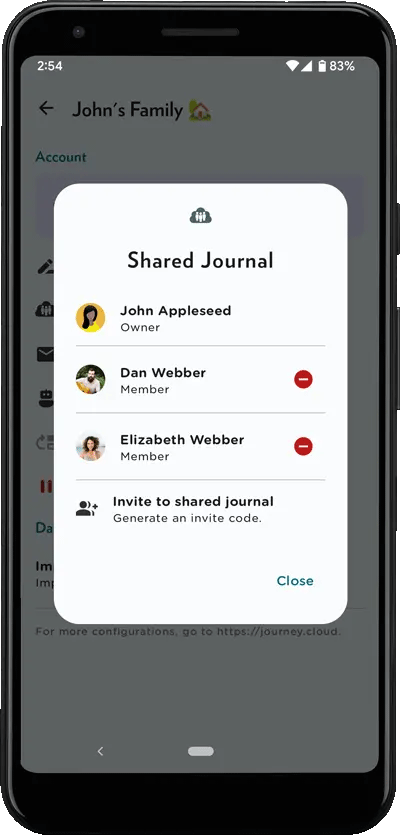

Each entry serves as a testament to the benefits of these relationships, reinforcing your connection and the value you derive from these interactions. Over time, the journal evolves into a powerful reminder to continually invest in these enriching bonds, ensuring that the people who make your day brighter are an active, celebrated part of your journey. As you document and share in this ensemble of reflections, it becomes clear which relationships to treasure and invest in for a happier and more fulfilling life.
3. Focus on what you have and not on what you don't have
When you appreciate and focus on what you already have in your life, what you have tends to appreciate in value and becoming more apparent to you.
Photo by Rosie Kerr / Unsplash
Being grateful for the goodness that is already evident in your life will bring you a deeper sense of happiness and gratitude. These need not be the big things. Warm blankets, a hot cup of coffee in the morning, being able to phone your best friend whenever you want, And that’s without having to go out and buy or acquire anything new. It makes sense. You will have a hard time ever being happy if you aren’t thankful for what you already have.
Maintaining a journal can be a powerful practice in cultivating gratitude and focusing on the abundance present in our lives rather than the lack. When we take time to record our daily experiences and list the things we're thankful for, we shift our attention from a mindset of scarcity to one of appreciation. This habit of noting down simple joys, accomplishments, and instances of good fortune serves as a reminder of the wealth of positive elements already surrounding us. Journaling helps in recognizing the oft-overlooked blessings, be they supportive relationships, personal achievements, or the sheer beauty of nature.
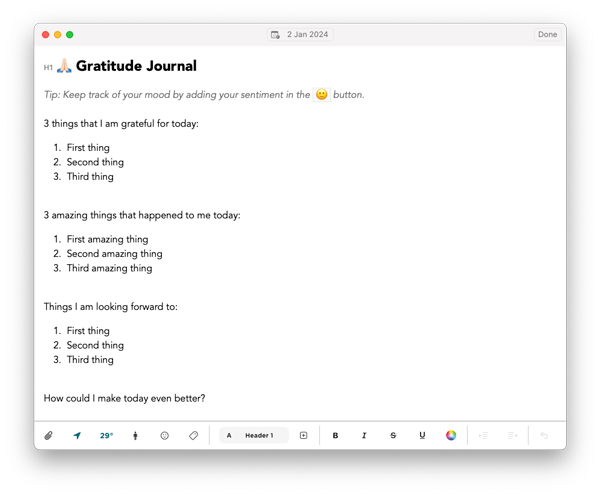
By chronicling these details, we create a tangible record that can be revisited, reinforcing the value of our current possessions and experiences. This consistent reflection can dramatically alter our perspective, decreasing our preoccupation with what we lack and increasing our contentment with what we have. Through the lens of a journal, we learn to cherish the present and nurture a deep-seated sense of satisfaction.
4. Pause to reflect and recalibrate whenever you can.
The power of reflection often goes unnoticed. There is no better way to move forward in the best way possible than to pause, reflect, review and move from a true understanding of your current situation or position.
Reflections and journaling allow us to look back at our own journey and document our progress from time to time, to better understand ourselves from an objective point of view. Sometimes we forget the lessons that our life experiences teach us and repeat the same mistakes because we are unable to detach ourselves from the situation to see the real lessons life has for us.
Photo by Toa Heftiba / Unsplash
A reflective journal provides a unique opportunity to pause, reflect, and recalibrate, acting as a personal space where thoughts, feelings and experiences are freely explored and expressed. This act of writing and introspection triggers self-awareness, promotes deeper thinking, and opens pathways to new insights that might otherwise go unnoticed. As we write, we are prompted to deconstruct experiences, and figure out what worked, what didn't, and why. This reflection enables us to view our experiences from different perspectives, giving us the opportunity to learn, adjust, and plan accordingly. The therapeutic practice of penning down our thoughts in a reflective journal allows us to take a break from the constant pace of life, helping us to gain clarity, relieve stress, and recalibrate our path whenever required.
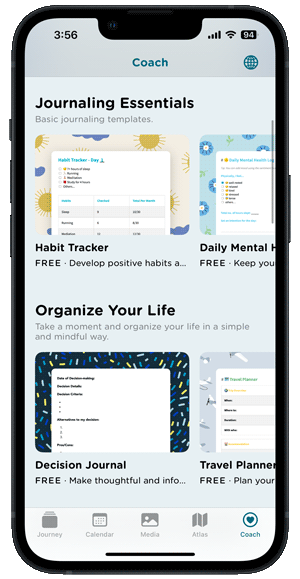
Using a tool like the Journey weekly, mid-year and yearly reflective journal template, can facilitate your moments of pause for reflection and recalibration in a structured and effective manner. The structured format provides a consistent framework for reflection that systematically and thoroughly encourages the extraction of valuable insights from your experiences. Weekly reflections enable you to assess short-term goals and relish in small victories, helping to maintain momentum and motivation. Mid-year and end-of-year reflective entries provide the opportunity to evaluate progress on a broader scale, celebrate significant achievements, learn from mistakes, and realign future objectives. This structured approach helps you solidify learning from experiences, uncover patterns, identify areas for improvement and growth and transform insights into actionable steps. Thus, using a reflective journal template like Journey not only nurtures regular self-reflection but also fosters personal growth, resilience, and adaptability in different life scenarios.
5. Let go of what does not add value to your life
As we grow older, we accumulate relationships and sometimes physical things that could have once had significant meaning to us. But this meaning could start to depreciate over time due to various reasons, circumstances, or just because of the perils time.
Photo by Ankush Minda / Unsplash
Our life experiences continuously shape and evolve us, and the roles of these people or objects may change as well, for better or worse. It is important to identify and understand at various checkpoints in our lives why we keep certain things closer to us than others, and whether they still add value to our lives. Sometimes we have to accept this change and learn to let go of people or things to allow room for other things and relationships to enter and give our life new, if not greater purpose and motivation to move forward in life and achieve the things we want to.
Keeping a journal serves as a therapeutic release and a method of self-discovery, fostering a process of letting go of non-essential aspects in life. When we pen down our daily encounters, we articulate what brings us joy and what saps our vitality. This introspective practice provides a clear contrast between what enriches our lives and what detracts from it. By journaling, we consciously observe our engagements, relationships, and habits, evaluating their significance and benefit. The act of writing itself can be cathartic, as we externalize and dissect our attachments to things that do not add value.
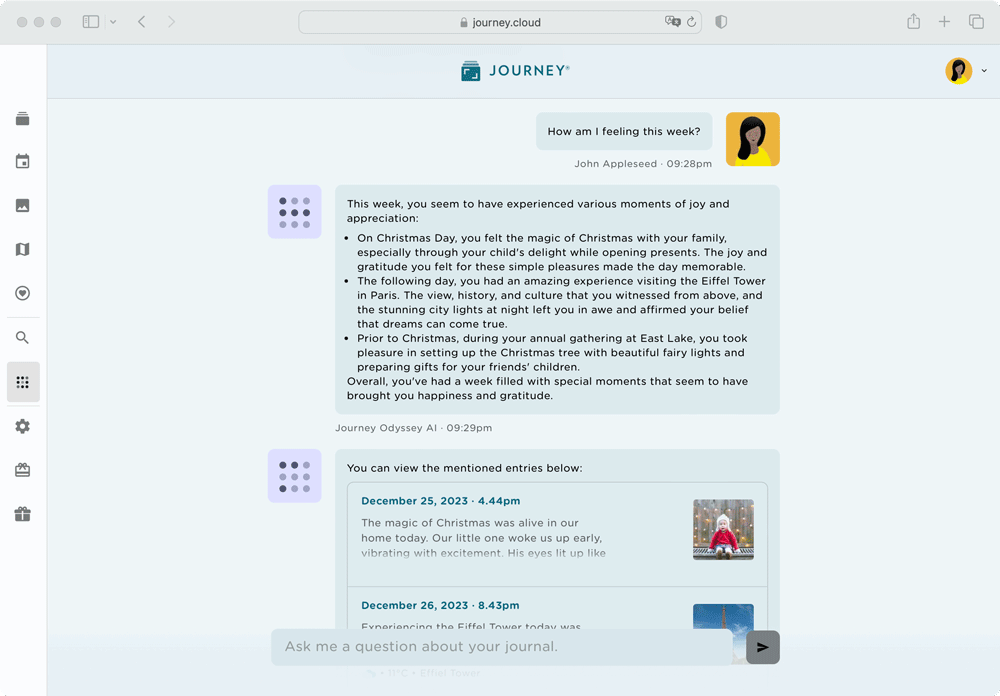
As our journal fills with thoughts and reflections, we can pose questions related to ourselves using Journey's Odyssey AI. This AI can identify emerging patterns in our entries, guiding us to recognize excess baggage that may be hindering our progress, providing us the opportunity to let go and move forward.
This can lead to actionable insights and decisions, such as ending toxic relationships, abandoning unproductive habits, or reallocating our time and energy to what truly matters.
Life is too short to spend time with people or on things that drain the happiness out of you. When you free yourself from negative people and things, you give yourself back time and space to be you. And living life on your own terms allows you to choose true happiness.
6. Internalize setbacks or failures as steps forward.
See failures or setbacks as a way forward. Trying and failing is more productive than not giving it a go at all. Re-framing the way we see and internalize our circumstances can greatly impact our state of mind and hoe we perceive our lives.
Breaking this barrier of limited thinking, or thinking that we are set up for failure or disappointment from the get go because of unfavorable circumstances or luck will not push us to be, do, and feel our absolute best. Being pushed to do our very best in the worst of situations or circumstances is when you see true growth and potential, and will leave us feeling the most satisfied and happy.
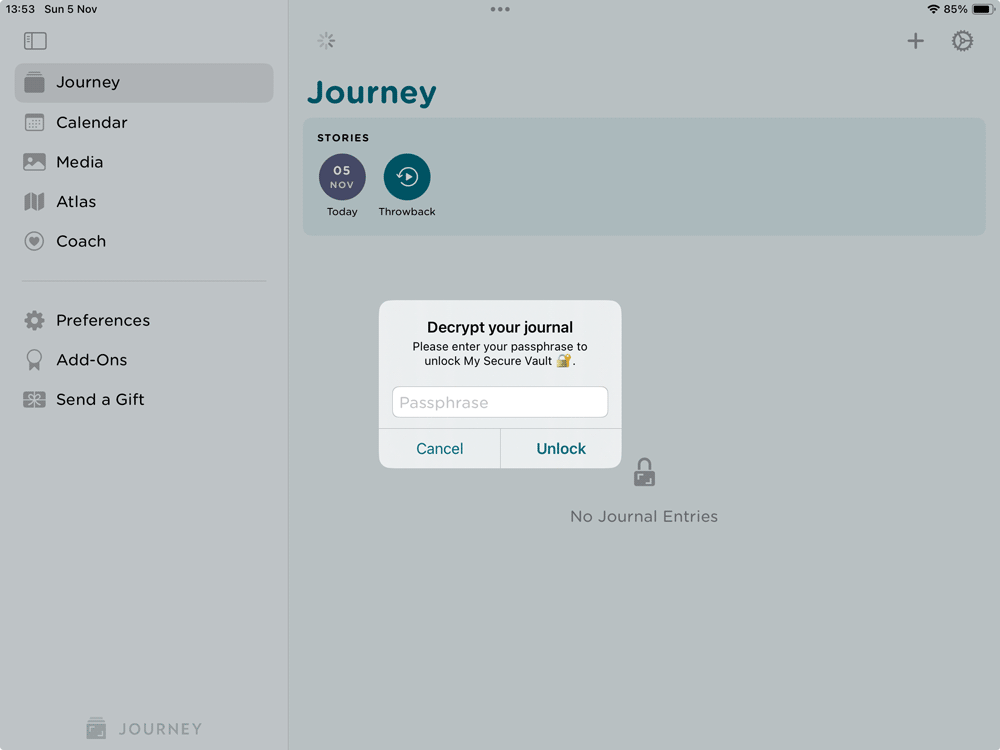
Keeping a journal can be an incredibly helpful tool in internalizing setbacks or failures as steps forward. By reflecting on what went wrong and documenting the emotions and thoughts associated with those experiences, it allows for a deeper understanding and acceptance of these setbacks as inevitable parts of the learning process. Writing about the setbacks helps to externalize our thoughts and emotions, creating a safe space to process and make sense of what happened. Through journaling, we can also identify any patterns or recurring mistakes, providing valuable insights to avoid similar pitfalls in the future.
Moreover, by recording our thoughts on how we can improve and grow from these setbacks, we transform them into crucial stepping stones on our path towards success. Overall, a journal serves as a personal growth tool, reminding us that failure is not a dead-end but rather a necessary part of the journey towards reaching our full potential.
Maintaining a journal cultivates the habitual act of choosing happiness with intention and mindfulness. This practice turns every journal entry into a proactive choice to appreciate the moments of life and embrace personal growth despite the circumstances. It creates a shift from seeking happiness externally to finding it within ourselves by transforming our perceptions and attitudes towards life.
In the safe confines of a journal, every silver lining is documented, every moment of gratitude for the simple pleasures of life recorded, fostering the practice of acknowledging even the smallest of blessings. And with each sunrise, the journal bears witness to our strength and resilience, holding space for hope and new beginnings. These recorded affirmations, over time, become a powerful tool to inspire courage, promote positivity, and create a better, happier life.








